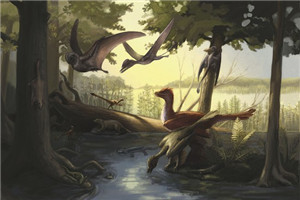(单词翻译:单击)

Tyrannosaurus rex, meet your Chinese cousin.
霸王龙,过来见见你的中国老表。
Researchers recently said that the remains of a long-nose tyrannosaurid species, the Qianzhousaurus sinensis, were found in southern China near the city of Ganzhou in Jiangxi province. The carnivore was probably alive during the late Cretaceous period, scientists say, some 66 million years ago.
研究人员最近表示,华南地区江西赣州市附近发现了一种长鼻子霸王龙――虔州龙的遗骨。科学家说,这种食肉动物可能生存在大约6,600万年之前的白垩纪晚期。
The news has captured global headlines, especially given the vividness of the new critter's nickname, the Pinocchio Rex, after its big nose. The news also raised hope among scientists that it might help them better understand the history of Asia's predatory, long-snouted dinosaurs.
图为艺术家做的效果图,图中是两只虔州龙在猎食。消息引起了全球媒体的关注,更何况这一新发现物种还因为它的大鼻子获得了一个生动的绰号:匹诺曹霸王龙。消息还引起科学家的希望:它或许会帮助他们更好地理解亚洲掠食性长鼻子恐龙的历史。
According to University of Chicago paleontologist Paul Sereno, the world is in the middle of a 'renaissance' in dinosaur discovery, with China helping lead that charge. By some estimates in recent years, a new dinosaur is named on average every two weeks.
据芝加哥大学(University of Chicago)古生物学家保罗・塞雷诺(Paul Sereno)说,世界正处于恐龙发现的“复兴期”,中国等国处于前沿。据近些年的一些估计,平均每两个星期就有一种新的恐龙被命名。
Such a renaissance, Mr. Sereno says, is being driven by 'increased searching and increased knowledge and awareness about fossils by the public, especially in places like the countryside in China and the U.S.' In the same week that the 'Pinocchio Rex' was announced, a new early bird dinosaur from China was also named, says Philip D. Mannion, a junior research fellow at the Imperial College London with expertise in sauropod dinosaurs.
塞雷诺说,这场复兴背后的一个推动力量,是“搜索工作增加,以及公众对化石的知识和认识增加,特别是在中国和美国的乡村地区”。伦敦帝国理工学院(Imperial College London)专攻蜥脚类恐龙的初级研究员菲利浦・曼尼恩(Philip D. Mannion)说,在“匹诺曹霸王龙”公布的同一个星期,一种来自中国的早期鸟类恐龙也被命名。
Globally, T-rex -- along with brontosaurus, stegosaurus and triceratops -- may be the best-known dinosaurs out there, and no surprise. As Mr. Mannion says, most such A-list dinosaurs were discovered in North America in the late 19th century or early 20th century and had some of the earliest quality mounted specimens, which quickly gave them a latch on the public imagination. (Though England had previously launched displays of dinosaurs in the 1850s, they were often, at best, fanciful in their approach toward science.)
2013年10月,中国香港,香港科学馆(Hong Kong Science Museum)门外展出一具炳灵大夏巨龙的模型。在世界范围内,霸王龙――以及雷龙、剑龙和三角龙――可能是最知名的已发现恐龙,这并不令人奇怪。正如曼尼恩所说,大部分这类重要恐龙都是19世纪末20世纪初在北美发现的,并被做成第一批优质标本架标本,很快俘获公众的想象。(虽然英国在之前的19世纪50年代就曾举办恐龙展览,但在科学方法上,这些展览常常充其量也只是幻想。)
As China continues to discover ever more dinosaurs, here's a quick list of some that you might not have learned about as a child--a sort of People's History of Dinosaurs, Part I, if you will:
鉴于中国发现的恐龙越来越多,下面简单列出一些你在童年时期可能没有听说过的恐龙,姑且称为“人民恐龙史:第一章”吧:
The Zizhongosaurus, discovered in Sichuan's Zizhong county, meaning 'lizard from Zizhong': a large-bodied, long-necked herbivorous dinosaur.
资中龙(Zizhongosaurus),发现于四川省资中县,意思是“来自资中的龙”,是一种大体型、长脖子的食草恐龙。
The Chungkingosaurus, found near modern Chongqing (which used to be spelled Chungking), and resembles a stegosaurus, with a spiky, plated back.
重庆龙(Chungkingosaurus),发现于现代重庆的附近,背上有钉子和甲片,形似剑龙。
The Lanzhousaurus, an herbivore with unusually large teeth, discovered in the northwest Gansu region in 2003.
兰州龙(Lanzhousaurus),食草动物,牙齿不一般的长,2003年发现于西北的甘肃地区。
The Xiaosaurus, or dawn lizard, a swift runner and sharp-clawed herbivore from what's today Sichuan province, discovered in excavations that began in 1979.
晓龙(Xiaosaurus),意思是拂晓时的龙,跑动迅速,爪子尖利。这种食草恐龙来自今天的四川省,是在1979年开始的发掘过程中发现的。
Then there's the Xinjiangovenator, meaning Xinjiang hunting dinosaur, an Early Cretaceous creature that was established as a new species in 2005 and whose name would sound especially good in a kid's book. (No relation to this Governator.)
然后还有新疆猎龙(Xinjiangovenator),为白垩纪早期生物,2005年被确认为一种新物种,要是放在童书里面,它的名字将会特别好听。(跟“州长侠”(Governator)没有关系。)
For dinosaur hunters, China -- with its vast areas of countryside, much of it being excavated for development -- offers some of the world's best prospects. In the case of the so-called Pinocchio Rex, it was discovered by some workers digging a new industrial park. (It's not just dinosaurs, either: a man recently stumbled on a Song dynasty relic after relieving himself on the side of a road.)
在寻找恐龙的人看来,中国拥有巨大的乡村地区,很多地区又在为了发展而开挖,所以拥有世界上发现恐龙的最好前景。匹诺曹霸王龙就是一些工人在一个新的工业园开挖的时候发现的。(同样不只是恐龙:一名男子前不久在路边方便的时候偶然发现了一处宋代遗迹。)
Though China's exploration of its dinosaur past has mostly boomed in the past two decades, Mr. Mannion says it has quickly caught up to North America in terms of numbers of species being discovered. 'It's not as well sampled as North America, but despite a shorter time in study, it's getting to a similar number of species in North America -- it's at least rivaling it,' he says. He cites places such as northeastern China's Liaoning province as having some particularly good instances of preserved fossils, adding that such fossilized feather discoveries have helped scientists make key breakthroughs in their understanding of the origin of both feathers and birds.
曼尼恩说,虽然中国对其恐龙化石的勘察主要兴旺于过去20年,但在发现物种数量方面,它已经迅速赶上北美。他说:“其标本制作赶不上北美,但是,尽管研究时间更短,发现的物种却与北美相近,至少是平起平坐。”他说,中国东北辽宁省等地拥有一些特别不错的保存完好的化石,而且这类化石羽毛的发现已经帮助科学家在理解羽毛及鸟类起源方面取得了关键性的突破。
So in the future, rather than My T-Rex Has a Toothache, maybe authors will be writing things like 'My Xiaosaurus Has a Stomachache,' instead. Lulu and the Lanzhousaurus has a pretty good ring, too.
所以在将来,童书作者可能就不再写《我的霸王龙牙齿痛》(My T-Rex Has a Toothache),而是写《我的晓龙肚子痛》了,《露露养雷龙》(Lulu and the Brontosaurus)变成《露露养兰州龙》,听起来也是很带感的。


